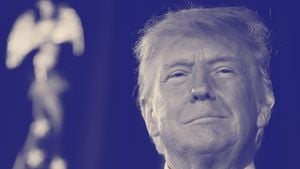Matt Gaetz, the brash Republican congressman from Florida, has been nominated by President-elect Donald Trump to serve as the next Attorney General of the United States. This announcement, made on the heels of the recent election, has created significant buzz, not just due to Gaetz's outspoken support for Trump but also because of his controversial past and the numerous legal challenges he faced during his political career.
During his time as a congressman, Gaetz became known for his alliance with Trump and his aggressive stance against Democrats, especially during the impeachment trials. His nomination is not without its skeptics; many lawmakers, including some within the Republican Party, have openly expressed their doubts about his qualifications and ability to be confirmed by the Senate. For those who follow U.S. politics closely, Gaetz's candidacy raises numerous questions about the direction of the Justice Department under his potential leadership.
Born to a prominent family, Gaetz made headlines early on for numerous reasons, including his brazen support for Trump and his brash statements against the so-called establishment within his own party. A key aspect of his political rhetoric has revolved around the issues of censorship and the power of Big Tech. Gaetz has accused tech companies of silencing conservative voices, setting the stage for what might be his battle as Attorney General to regulate these corporations more strictly.
His approval for the position is complicated by his history with the Justice Department itself. Gaetz was the subject of a sex trafficking investigation, which he vehemently denied, and allegations of sexual misconduct from the House Ethics Committee. The investigation had its origins stemming from his ties with convicted former Seminole County tax collector Joel Greenberg, who allegedly engaged in illicit activities involving underage girls. Although the federal probe didn't result in charges against Gaetz, the shadow of these investigations looms over his candidacy.
On the legislative front, Gaetz has not only focused on the investigations directed his way but has also taken stances aligned with Trump's anti-establishment vibe, pledging to root out what he calls the "systemic corruption" within the Justice Department. Trump has pledged to overhaul the agency, which he believes has been weaponized against him and his allies. This potential overhaul is extremely significant considering the convoluted investigations surrounding Trump's own activities during and after his presidency.
During his announcement, Trump framed Gaetz's nomination as pivotal, attempting to separate the administration from the previous Justice Department under Attorney General Merrick Garland. Trump's goal is clear: to reshape the department to prioritize investigations against perceived enemies of the state from within the Democratic Party and even within his own party. Gaetz's confirmation would likely pave the way for aggressive inquiries and potentially retaliatory measures against individuals who have opposed Trump.
Republican congressional leaders are divided over Gaetz's nomination. Some, such as Rep. Anna Paulina Luna from Florida, have rallied to his defense, claiming his extensive experience on the House Judiciary Committee makes him suitable for the role. Others are less convinced, with figures like Lisa Murkowski of Alaska expressing doubts over Gaetz being taken seriously as a candidate for such an important post.
His steadfast approach raises another pivotal question: what would his administration mean for business oversight and regulation, especially concerning Big Tech and corporate mergers? Gaetz's fiery rhetoric against companies like Amazon and Meta indicates he wouldn't shy away from calling for their breakup. He has referred to the current system as "manipulated" by Silicon Valley, pressing for more stringent antitrust laws going forward. This aligns with the sentiments of some progressive lawmakers who have long called for significant reforms of the corporate structure dictation. If confirmed, Gaetz's tenure might see increased scrutiny placed upon tech giants, paralleling moves made by the current administration's Federal Trade Commission led by Lina Khan.
Anticipation surrounds Gaetz’s potential to not only impact the regulatory environment but also the very fabric of civil liberties as it pertains to freedom of speech. With his previous comments about Big Tech censorship, it is believed he would advocate for policies protecting these corporations from claims of censorship when it pertains to content moderation, raising concerns for many civil rights advocates who worry over the balance of free speech versus corporate control over communication platforms.
The Senate confirmation process will be one to watch closely as it could reveal the broader divides within the Republican Party and touch on issues of governance, rights, and justice. Some speculate Gaetz's contentious history—both with personal scandals and combative political tactics—may play against him when it’s time to seek those necessary votes.
Despite worries over his controversial background, his steadfast loyalty to Trump and his agenda may win him favor with the parts of the Republican Party energized by Trump's message of change and defiance against established norms. Following his announcement, Gaetz expressed enthusiasm and readiness to serve, stating, "It will be an honor to serve as President Trump’s Attorney General!" This simple yet defiant declaration signals he is prepared for what will likely be fierce debates and passionate opposition during his confirmation period. But whether he can transform his political persona from the controversial congressman to the respected leader of the Justice Department remains uncertain.
Still, as the political climate remains heated, this nomination marks yet another step on the path toward significant changes not just within the Justice Department but across much of government itself, hinting at more tumultuous times as the new administration takes shape.
Critics of Gaetz warn about the possible ramifications of his leadership, especially considering the increasing focus on ethical governance and accountability following years of divisive politics. With mounting evidence of partisan strife and growing concerns over the future direction of American democracy itself, the importance and influence of the Attorney General’s position cannot be understated.
With each passing day, the conversations about Gaetz continue to heat up, as the public and Senate lawmakers alike contemplate the future impact his potential confirmation could have—both on the Justice Department's role and on the very core issues surrounding justice and governance. Gaetz's rise, marked with contention and fervor, encapsulates the current zeitgeist of American politics.



